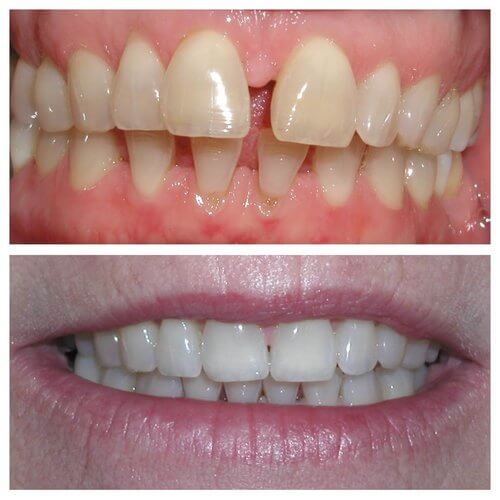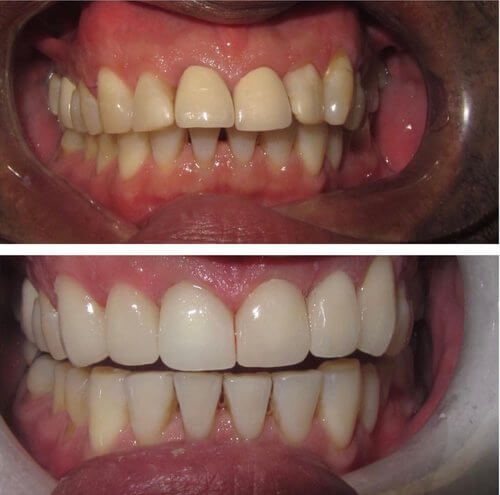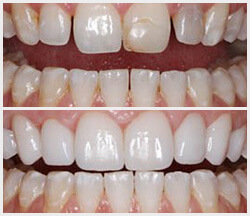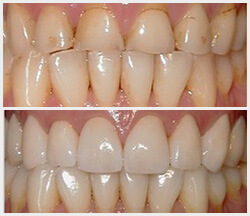Temporomandibular joint (TMJ) disorders are a common condition affecting millions worldwide. One lesser-known symptom of TMJ disorders is neck pain. Our Staten Island dentists want patients to know the connection between TMJ disorders and the neck. We’ll also discuss some treatment options available to alleviate your symptoms.
Neck Pain Symptoms Associated With TMJ Disorder
Neck pain associated with TMJ disorder can manifest in different ways, such as mild to severe. Symptoms you may experience include:
- Dull ache or throbbing pain in the neck or shoulders
- Shooting pain or numbness and tingling in the arms or hands
- Intermittent or constant pain that may worsen with jaw movement or prolonged periods of sitting or standing
- Neck stiffness and pain
- Headaches or migraines
How Do I Know if My Neck Pain Is Caused by TMD?
If you’re experiencing neck pain and you’re not sure whether it’s caused by TMJ disorder (TMD), there are a few signs that may suggest TMD as the underlying cause:
- Jaw Pain: TMD affects the jaw joint, so if you’re experiencing pain or discomfort in your jaw along with your neck pain, TMD may be the culprit.
- Difficulty Opening Your Mouth: If you’re having trouble opening your mouth fully or experiencing a “locking” sensation in your jaw, this may be a sign of TMD.
- Headaches: Headaches are a common symptom of TMD, and they may be associated with neck pain. If you’re experiencing headaches along with neck pain, TMD may be the cause.
- Jaw Clicking Sounds: TMD can cause a clicking or popping sound in the jaw joint when you open or close your mouth. Pain or discomfort often accompanies this.
Neck pain can have many causes, so if you’re experiencing neck pain along with any of these symptoms, it’s a good idea to see a healthcare professional for an accurate diagnosis.
How to Diagnose TMJ Disorder and Neck Problems
Here are some steps your healthcare provider may take to diagnose TMD and related neck problems:
- Medical History: Your healthcare provider will likely ask about your medical history, including any past injuries or surgeries and current symptoms.
- Physical Exam: Your healthcare provider will examine your jaw, neck, and shoulders to check for any signs of TMD or neck problems. They may also ask you to move your jaw in different directions to see if it causes pain or discomfort.
- Diagnostic Imaging: Your healthcare provider may order X-rays, magnetic resonance imaging (MRI), or computed tomography (CT) scans to get a more detailed look at your jaw and neck.
- Electromyography (EMG): An EMG test measures the electrical activity in your muscles and can help diagnose muscle problems in your jaw and neck.
- Referral to a Specialist: You may be referred to a specialist, such as a dentist or an ear, nose, and throat (ENT) doctor, for further evaluation and treatment.
The diagnosis of TMD and related neck problems can be complex and may require input from multiple healthcare providers. If you’re experiencing symptoms of TMD or neck problems, seek medical attention to get an accurate diagnosis and treatment.
Treatments for Managing Neck Problems Caused by TMD
Neck pain caused by TMJ disorder can be uncomfortable and disruptive to your daily life. Fortunately, there are several treatment options available to help manage this type of neck pain.
Treatment strategies for managing neck problems caused by TMD may include:
- Lifestyle Changes: Certain lifestyle changes can help reduce the symptoms of TMD and related neck problems. For example, avoiding hard or chewy foods, reducing stress, and practicing good posture can all help alleviate neck pain.
- Medications: Over-the-counter pain relievers, such as ibuprofen or acetaminophen, can help reduce pain and inflammation associated with TMD. Dr. Name may also prescribe muscle relaxants to help ease muscle tension in the jaw and neck.
- Physical Therapy: Physical therapy can help treat TMD and related neck problems. A physical therapist can teach you exercises and stretches to help strengthen your jaw and neck muscles and improve your posture.
- Mouth Guards: If you grind or clench your teeth at night, a mouth guard can help reduce the stress on your jaw joint and alleviate neck pain.
Injections: Injections of corticosteroids into the joint can help reduce inflammation and relieve pain. - Surgery: Surgery is usually a last resort for treating TMD and related neck problems. If other treatments aren’t effective, your healthcare provider may recommend surgical intervention.
Frequently Asked Questions
Can TMJ cause a pinched nerve in the neck?
Yes, TMJ can cause a pinched nerve in the neck. The muscles that control the jaw are connected to the muscles in the neck, so when these muscles become overworked or inflamed, they can compress nearby nerves and cause pain, numbness, or tingling in the neck or shoulders.
What does TMJ neck pain feel like?
TMJ neck pain can feel like a dull ache or throbbing pain in the neck, shoulders, or upper back. Some people may also experience pain or numbness in their arms or hands. In some cases, jaw pain, difficulty opening the mouth, or clicking or popping sounds when opening or closing the mouth may accompany TMJ neck pain.
How long does TMJ neck pain last?
The duration of TMJ neck pain can vary depending on the underlying cause and severity of the condition. In some cases, TMJ neck pain may resolve with rest, stress reduction techniques, or over-the-counter pain medication. However, if the pain persists or becomes severe, it’s crucial to see a healthcare professional for diagnosis and treatment.
When should I see a doctor about my neck pain?
You should see a doctor about your neck pain if it’s severe or accompanied by other symptoms like difficulty moving the head or arms, numbness or tingling in the arms or hands, or fever. If you’re experiencing neck pain after a recent injury or accident, seek medical attention to rule out any underlying conditions.
Find Relief From Neck Pain Caused by TMJ Disorders
While TMD is primarily associated with jaw pain, it can also significantly impact the neck. Muscle tension and referred pain caused by TMD can lead to neck pain, stiffness, and headaches. However, there are several treatments available for those experiencing TMD-related neck pain, including lifestyle changes, medications, and physical therapy.
If you’re experiencing TMD symptoms or neck pain, contact our Staten Island office to schedule a consultation with our dentists. They’ll review your medical history and work to determine the best treatment for your needs.



Insurance
We accept many insurances. Please contact one of our Insurance Coordinators to discuss your dental coverage plan.
(718) 948 5111
appointments@sidental.com
Open 7 days a week
Reviews
The dentists are absolutely excellent…
“I have been going here for years. The dentists are absolutely excellent and they always have an appointment available that fits into a busy schedule. I also completed invisilgn and my teeth are perfectly straight now. They also practice preventive medicine and just went in for my 6 month cleaning. Every time feel like I have a new set of choppers and best yet the check up noted no cavities!.”
— J.R
Pleasant visit
“As usual, it was a pleasant visit thanks to Dr. Nasso and her great staff..”
— C.M.
Always treated with courtesy and respect.
“Always treated with courtesy and respect. All of my questions were answered regarding upcoming treatments..”
— J.C.
Smile Profile




Put your best face forward.
Create a positive change to your teeth and your smile.
